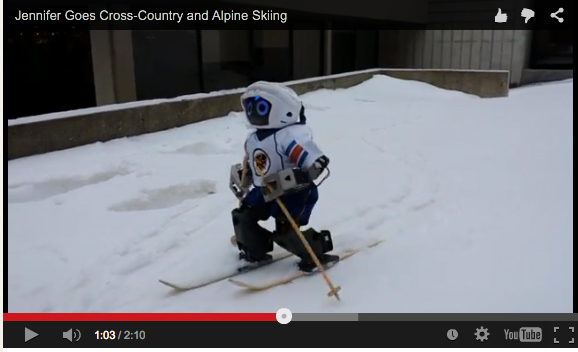
Jennifer the robot skiing! Built by the University of Manitoba Autonomous Agents Laboratory
Jennifer the robot goes skiing
Jennifer, the first hockey-playing robot, was built at the University of Manitoba and featured on science TV shows. Now, she’s taken to the slopes, although she’s not ready for the black diamond runs. But maybe the bunny hill.
Built by University of Manitoba students in the Autonomous Agents Laboratory, the doll-sized robot won an international competition in 2012 for its ability to skate and play hockey. Now, the team has taught it to ski both cross-country and downhill.
Jennifer has been trying out cross-country and alpine skiing for the U of M’s application for the 2015 DARwIn-OP Humanoid Application Challenge in Seattle in May.
John Anderson and Jacky Baltes are co-directors of the lab. Anderson says: “The cross-country skiing gait is based on the linear inverted pendulum model and is inspired by walking and ice skating gaits developed for the DARwIn-OP robot.”
Baltes adds: “We have only begun studying alpine skiing, but have demonstrated rudimentary braking and arcing using simple control of the skis’ edges. Improving the control of the alpine skiing is our primary focus, with improving the cross-country gait and allowing the robot to dynamically switch from cross-country to alpine skiing when it detects a change in inclination corresponding to a hill.”
The lab has published a YouTube video demonstrating Jennifer’s skiing prowess. Filmed outdoors at the University of Manitoba over several days (with wildly different temperatures and snow conditions), the little robot happily shooshes in one segment, and in another, points her skis together to stop as she whizzes down a slope.
Jennifer the robot is named after Jennifer Botterill, the Canadian three-time Olympic gold medal hockey player.
The Autonomous Agents Laboratory is one of the research laboratories within the Faculty of Science, in the department of computer science at the University of Manitoba. The lab’s goal is the improvement of technology related to robots’ hardware and software as well as the development of applications employing the technology.
For more information, please contact Dr. John Anderson, head, computer science, at: 204-474-8839 or email: andersj@cs.umanitoba.ca
Story by Chris Rutkowski






